Opening Image: Dress Róisín Pierce Necklace A Sinner in Pearls Shoes Malone Souliers
Like many of us, I’m sure, I’m guilty of constantly rushing around the streets of London. Head down, and a slight frown on my face, I waste no time catching a glimpse of the beautiful scenery of the city, even as I’m heading to meet folk singer and songwriter Maria, aka Avice Caro, for our interview. But in the sun-dappled Lincoln Inn’s Fields, the young woman brings with her a sense of calmness–a break from the metropolitan bustle we find ourselves sheltered from by the dark picket fence of the park. We catch up, sitting on the grass and watching the birds fly by–pigeons are some of Maria’s favourites–and the conversation meandered like a folk ballad.
‘Home Demos’, Maria’s first LP to be released on July 10th, holds itself to be exactly to her image: authentic, honest, and vulnerable. Recorded on a 1950s tape recorder with a 1940s ribbon mic, her upcoming album is more like a found object than a polished product. It’s a project as unconventional as the artist herself: no label, no manager, no studio—just total trust in the creative process and in the charm of crafting things by hand. “I believe these songs have a place in the world the way they are,” she says, lying on the grass. “They’re not perfect, but that’s what makes them beautiful.”
Maria speaks like she sings: with warmth, depth, and the occasional unexpected lyric that stops you in your tracks. But most importantly, she bears a sincere belief in making the simple things–the ones you tend to miss–magic.
We spoke about everything from heartbreak and creativity to faith and finding beauty in the mundane. Everything about the following interview is infused with Maria’s motto for her practice: that art is something you make with what you’ve got. In Maria’s case, a tape recorder from the 1950s, and a heart that feels everything, all too much.
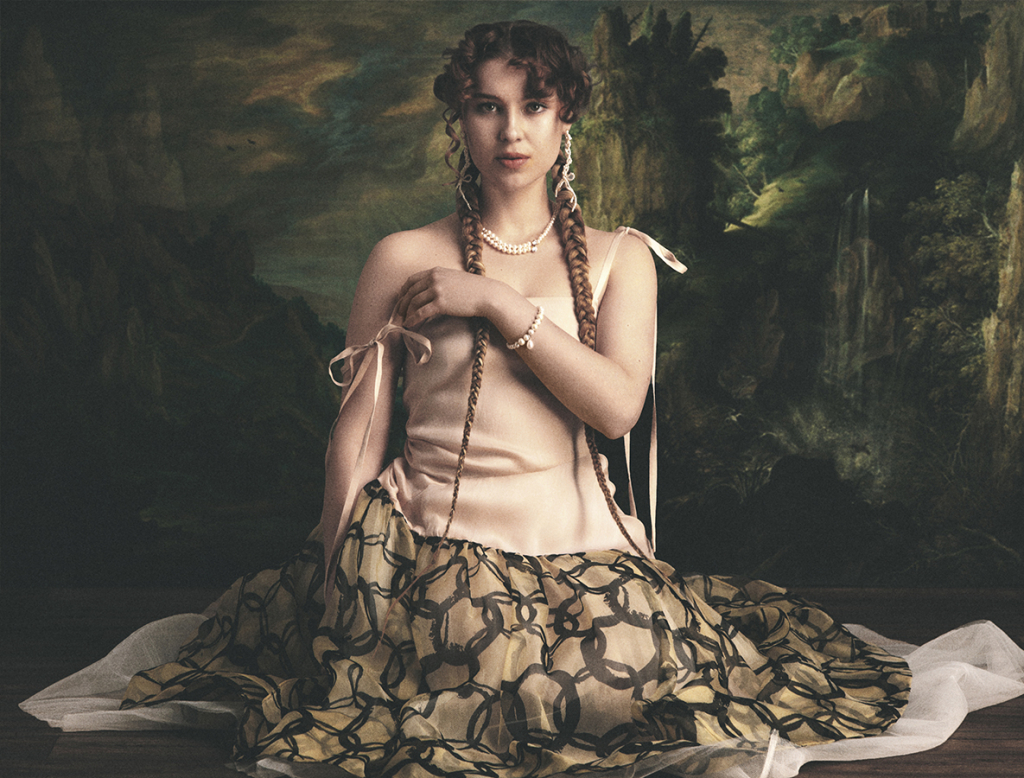
How did you even come up with the idea of using such ancient recording gear to make ‘Home Demos’?
My guitarist Alfie’s just got a bunch of old equipment at his house. We were rehearsing for a show, and he stopped and told me he had something to show me. He pulled out the recorder that was connected to this 1940s ribbon mic, and he played me this version of a Tom Waits song that he’d just done on guitar. It’s kind of a miracle that this project even came together honestly, because the mic doesn’t have a jack.
I was going to ask… How did you manage to get it to work?
Alfie managed to build this special box to plug the 1940s mic into the 1950s tape recorder,and that in itself is a miracle! And then there was this thing–it was like this organism–and it had all these wires protruding out of it. I remember there was this one bit where if we didn’t plug the wire into a certain angle, it wouldn’t record properly. We figured out all these ways of tapping it to make sure it would work. It had its own language.
I didn’t expect that at all. I thought you’d tell me you just went to a studio!
I really don’t know how anybody else would go about doing this kind of project nowadays, because firstly, you’d need to find the equipment in working order, but you also need to know what you’re doing. I really had no idea; Alfie engineered the whole project. There were certain situations where we’d get the perfect take, and we’d play it back and the tape machine would eat the tape up! Looking back on that process, I guess it was God telling us that wasn’t the right version.
It must’ve been quite an intimate process, to do this just with Alfie.
Yes. It was amazing, because I have such a busy life usually. I have an office job still, so I’m exhausted a lot of the time. So after work, it was refreshing to just be able to go to Aflie’s rather than having to be in a studio with a lot of people and having to impress them. I could just lie on the floor and record.
You have an office job? What do you do?
It’s a secret…
Right, I see.
I’m just kidding. I work in tech.
I’m sorry, did I really hear tech?
I know! I love it. I’ve always had a hundred different things going on in my life. I remember, even when I was in school, I would sneak off at lunch break to play music, but then I would go back to the classroom and be really academic. It’s easy for me to have all these different lives going on.
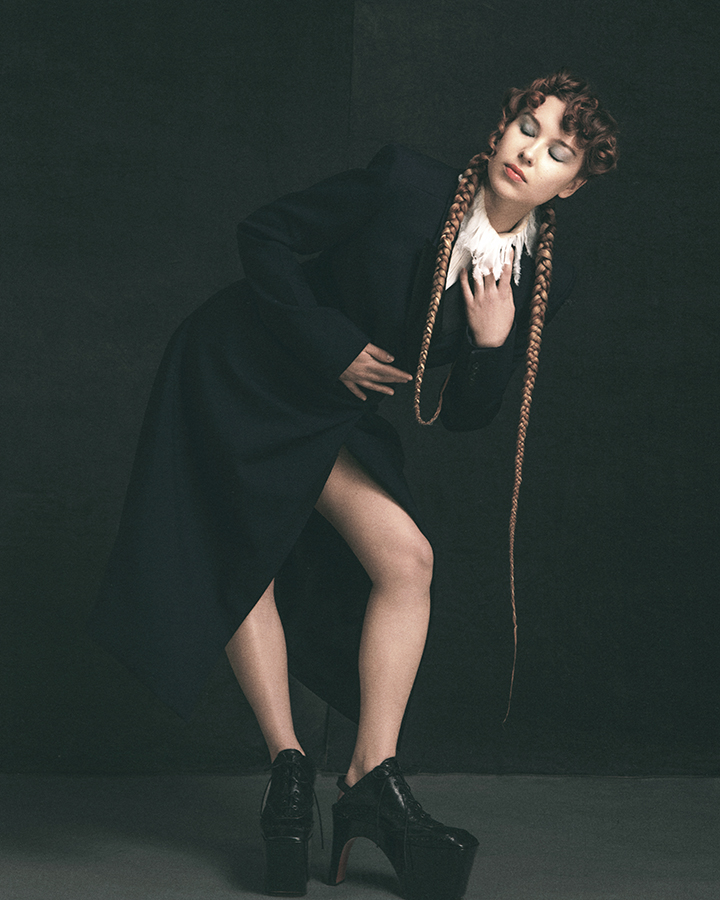
So music has always been part of your life then?
Definitely. I remember my first experience of music was when I was a child. I’d have dreams where I would write songs, and then I’d wake up singing and humming the melody! I’ve always been tapped into that world of sound and fairytales and composition.
Is there someone else in your family who’s musically inclined?
In terms of making music, no. But when I was a child, my parents used to sing me lullabies and it was my favourite time of the day. I remember feeling so enthralled. Both of them are Slavic, and the lullabies they knew were quite unconventional, to put it that way. I remember this Russian one, and the underlying message was not to sleep too close to the edge of the bed, or else the wolf will come and get you. I then became a nanny, and I’d tell the kids those stories and they were so scared! I remember it made one cry; it was awful!
Why did you gravitate towards folk music specifically?
I think it takes me back to that place of being a child and listening to my parents sing lullabies. Folk music is one of the genres that truly allows you to tap into the art of storytelling, there’s so much of these almost fairytale narratives. Another aspect is when you write these folk songs, their structure is often this one melody that loops over and over again; so you write them as a whole because it’s like writing a poem. Lastly–I was actually talking to a producer about this the other day who pointed this out–folk music is cyclical. You’ve got the melody, which loops over and over again, and it kind of lulls you. It’s relaxing, but it’s quite universal as well. Even though I suppose not many people of our generation would listen to folk music, I do think it still has a place in today’s society because it’s timeless. Some of these songs are so old, yet they’re still so resonant.
Many of the themes they bring up still feel relevant today, especially politically.
Definitely, and even on a personal level. For example, when Joan Baez sings ‘Silver Dagger’, which explores betrayal and men hurting you, those kinds of themes. You listen to it and think, ‘Wow, women have been going through this for centuries’. I think there’s something powerful and comforting about it. There are also a lot of women in folk. It’s dominated by women’s tales and women’s writing, and it’s amazing that so many of these stories still survive and stand the test of time. A lot of the women who sing these songs sound like birds. You get a real high out of singing these songs because you use your voice like an instrument in that way.
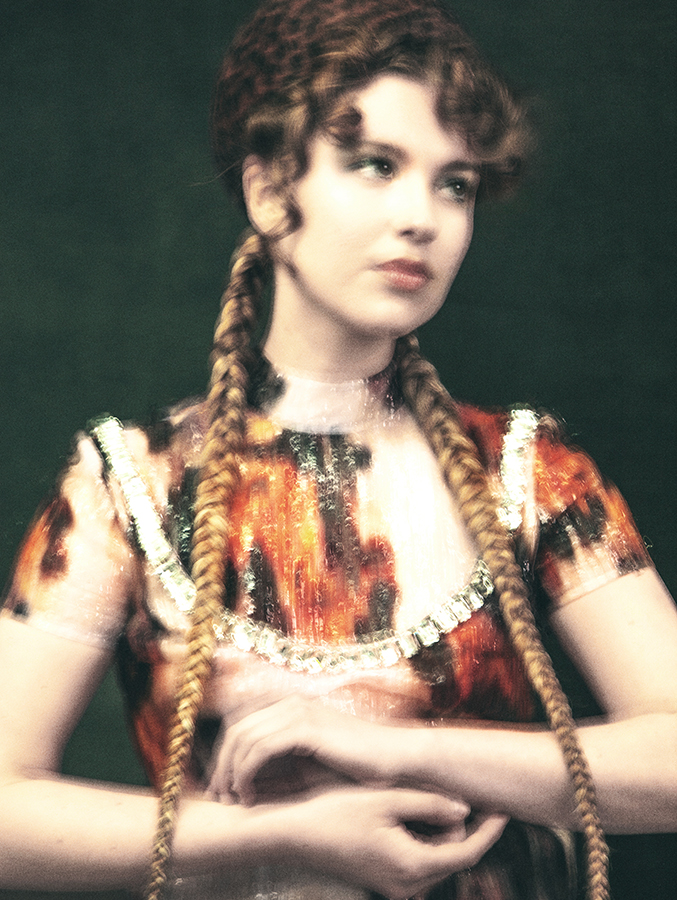
What’s your favourite topic to write about?
I’m fascinated by sadness and grief. I’m a very happy person, but for some reason I find sadness extremely romantic and poetic–and nature! So I combine these two things together. These feelings are almost incomprehensible to the human mind. Like, how does one describe grief? You don’t. You just experience it. There’s fun in being indirect about a subject. Sometimes, I’ll feel sad, and I think about how I can say it, without actually doing so. So I think about how the flowers would feel about the situation. I wrote a lyric the other day that was like ‘it was such an awful day that even the moon cried’, or something like that. I just love words, and I love language and its ability to create all these stories.
What are some of the silliest lyrics you’ve written?
Actually, there’s this song called ‘I Saw A Seagull in September’ on the new album. At the beginning, it’s this really intimate song about longing, yearning, sadness, and nostalgia. This person sees a seagull and it reminds them of their true love. You spend the whole song thinking that it’s an emotional song, but at the end, the lyrics are ‘It wasn’t a seagull, he was just a fat pigeon’. The rose-coloured glasses come off! I don’t know if you’re the same, but I’m such a dreamer and a romantic in every single regard, so being in love is really difficult because it’s really hard to see the situation for what it is. Naturally, you want to see the best in people, and when they’re hurting you, sometimes you need to take a step back.
Do you remember the first song you ever wrote?
I do. It’s called ‘Man Is Worm’. It’s about a man who gets really sad, he loses his hands, and then he can’t paint anymore. He looks outside and sees a worm that get eaten by a bird, and later on he’s like ‘Guess it’s time to die’. I must’ve been 14 when I wrote this. I don’t know why it’s so depressing!
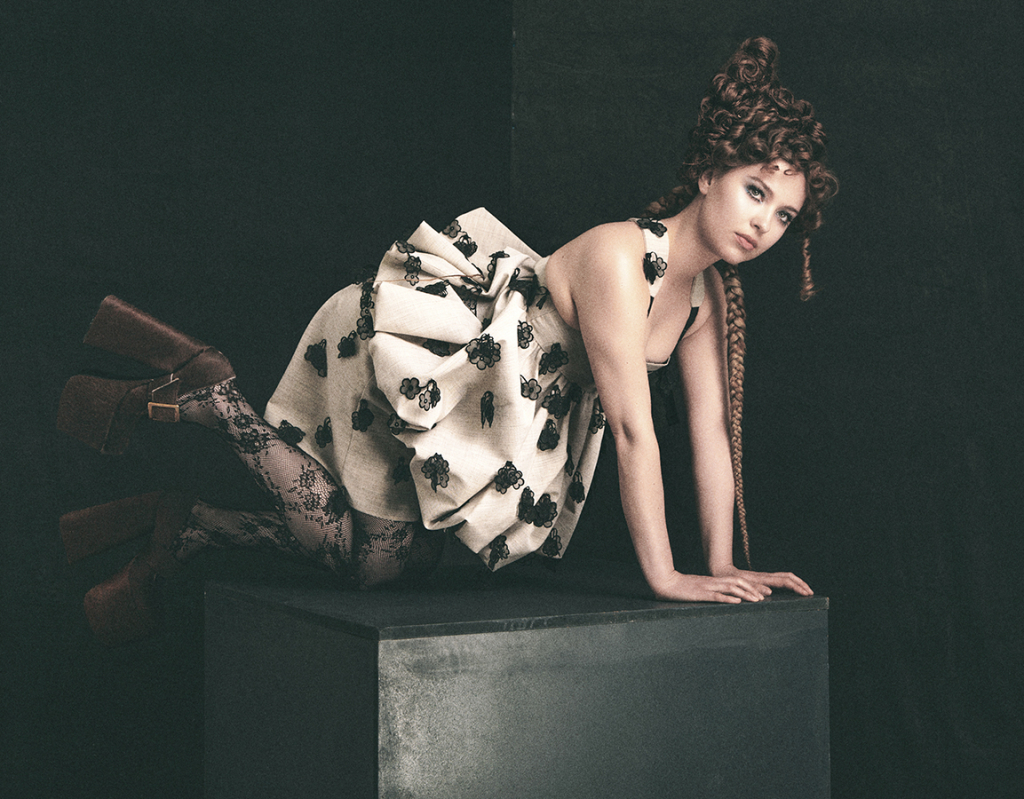
I have to say I love the name. Really it’s all a matter of perspective, isn’t it?
It’s funny because I got into this topic of conversation a couple of weeks ago with this guy. We were in a bar or something, and somehow we started talking about happiness. He asked what the best day of my life was, and I said ‘today’. He didn’t get it because we were in some random bar and the floors were sticky. But I think every day is the best day of your life if you live by that rule. Like right now, this is the best day of our lives. We’re in the park. There are beautiful birds, and they are screaming, and the sun is behind a cloud, but it will come back.. And what more do you need?
Sometimes you just have to take a step back and appreciate what you have, be content…
Exactly! I mean, it’s kind of why my whole album even exists. I remember when I was writing the songs, I had these ideas for how I wanted them to sound in the future, if I had access to a cello or violin, or an orchestra… But then I took a step back and thought that these songs have a place in the world, the way they are, so I just used the materials that were available to us because that’s the whole point of art. It’s about using what you’ve got and making do with the life and materials you’ve been given. And they’re not perfect! There are bits where the mic cuts out a bit, or it doesn’t recognise the frequency of my vocals; but I think that’s beautiful. I love making something perfect from something imperfect, and seeing the light of something that’s dark. It all relates to that idea of making do with the day that you’ve been given–that applies to the emotions, the situations, the circumstances, the materials, everything!
It’s a beautiful part of being alive to be able to deal with the ups and downs–no matter how big or small they might seem–and be resilient enough to get through the rough patches of life.
Absolutely! I think the most beautiful thing about losing yourself is finding yourself again. It’s fundamental, as a growing person. One day, when we’re old and gray, we’ll look back on these moments and think about how glad we are they happened. Because one day, you’ll have a daughter, or you’ll be an aunt to somebody, and you’ll be able to tell them the tale about how you fell face flat on the ground, but then you got back up! I was listening to this interview with John Berger recently, and he got into the topic of happiness and tenderness. I feel like people tend to think that somebody who’s happy all the time hasn’t experienced grief or suffering. But that’s not true. He was saying tenderness is a choice, and it’s truly the most powerful and freeing thing you can do. A person can understand there is so much suffering and pain and evil, but they don’t let that consume them. Really it’s the only thing you can control.
Is that mindset in any way related to your faith? You’ve been quite open about it on social media, and you even started a Substack about your journey.
It’s something that I’m still exploring. I grew up going to Christian schools, and I’d pray when I was younger. When I became a teenager, I was like ‘Screw this, I don’t believe in God’, but I’d still pray. Then, one Easter Sunday–I think it was about two years ago–I was in this gorgeous 900-year-old church. And instantly, I thought, ‘Oh, I actually do believe in God’. I enjoy reading the Bible and the stories, and I feel like they can be great examples to follow. I’m mostly inspired by the spiritual aspects of Christianity, of community, and finding a sense of belonging in a metropolitan city where everybody’s so individualistic. It’s nice to have one place that you go to on a Sunday to experience magic and transformation, and think about all the people that you love and care about, and how you can be a better person for them.
Has it been difficult for you to balance your spirituality with your line of work?
I found it easy to lose track of my life in the past, so Christianity has been really grounding for me. In moments of doubt, I just go back to being grateful and remembering that my life is a blessing. It’s doing the small things, like going to bed at night and thinking about your day, and saying ‘thank you’ for everything. Or reminding yourself that if it’s not okay right now, it will be eventually. It’s easy to lose sight of that. But to go back to the music industry, I think it’s the case with any sort of community: there will always be good and bad people, and some that come to you with empty promises. But for every person who lets you down, there’s always somebody who’s going to believe in you and make your life better. There’s a lot of darkness in music, I don’t know why… Thankfully, I haven’t really experienced it oo much. I’ve spoken to friends who’ve gone on tour, and it can be quite a lonely thing. It must be unsettling, having to uproot your entire life; but I’m not at that stage yet! So I guess for the time being, I’m lucky because I get to live a normal life, and do what I like.
Is that spiritual aspect something you ever try to connect to your music?
It’s funny because God has found His way to creep into the songs I write every now and again. It’s not necessarily a conscious thing. I love hymns, and they remind me a bit of folk songs in the way they’re structured, as in they often have that one verse that repeats itself on loop. I do have this lyric in my album where I go ‘I prayed for Love, and then you came. I prayed for Peace, and then God took you away.” And I think that, after finding God, I don’t know. It’s just a comfort. I want to be the kind of person who believes in something. So it does connect to my music in some ways, but it always happens quite naturally.
What’s your starting point when you write music?
Fundamentally, every song comes from a feeling, and it’s wanting to do it justice with words and a narrative. But sometimes I’ll just be walking down the street, and a melody will come into my head–or sometimes I’ll be in the kitchen humming something and like the sound of it. I’m also inspired by a piece of literature, or music, and I have a character come up in my mind that I want to sing or write about, or a story I want to tell. I’ll sit down and map out the words, but it really varies. Sometimes it’s the melody that comes first, sometimes the characters or the tale. It can even be just a phrase. The other day, I just had the words ‘Be still, my quiet heart’, which then changed into ‘Be still, my tired heart’. It was looping around in my head, and I was just like, ‘I need to write a song about this!’. I got obsessed with it. I know I sound mad right now.
Actually, it makes more sense to me for it to be as spontaneous as what you’ve just described. It feels like your whole process it. Are you self-taught?
Yeah. I’m self-taught completely. I think I had a few guitar lessons when I was younger, but that’s it. I’d love to get harp and piano lessons someday, that’s my dream. But I love just discovering things on the guitar. It’s one of those instruments where you can just sit down and figure out certain arrangements and chords.
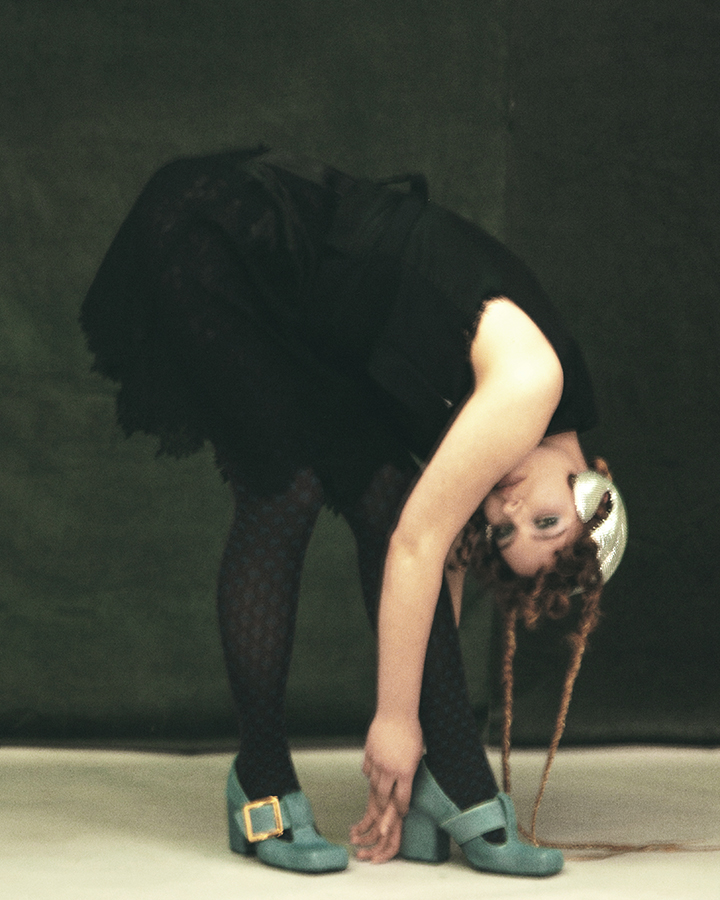
Is the guitar the only instrument you can play?
I have an omnichord! I initially bought it to write new songs, because I felt like at that time, my songwriting had become a lot more repetitive with the guitar. I wanted to try something new, and I was wondering whether it would change things if I wrote on a different instrument, whether that would create some new music, new ideas. So I got my omnichord, which is an electronic version of the autoharp. It sounded like a video game, so ethereal and strange and unique sounding. I just fell in love with it so much that it no longer just became something that I was composing music with. I released my EP ‘Mythweaving’, which has the omnichord on it, and then I started playing it live. That’s the story of my omnichord–I’m feeling very passionate about it!
You sold it very well. Now I want one! How do you hope your music will impact people?
I just want to make something that’s beautiful. Or even if whatever I sing about touches people, that would be nice. And also, relating back to the comments I made about folk music and it’s ability to make you feel a bit less alone, if I sing about something and someone’s experiencing something similar, I would like them to think, ‘Wow, that’s beautiful, and I feel the same.’
And what’s been your most memorable performance so far?
I was part of a folk collective called ‘Broadside Hacks’, and I had the opportunity to sing ‘Willie o Winsbury’. It’s a really beautiful Scottish folk ballad about this girl who falls in love with a guy, and her father’s like, ‘Why did you impregnate my daughter? I’m going to put you to death!’ And at the end of the song, he meets Willie, and he realises, actually, this guy’s pretty dope. And so he tells him he doesn’t have to die, and the couple juste rides off into the sunset. It was probably my favourite performance because I just love that song–it’s such a nice one to sing. It’s so high with all the lilting notes, and it really lulls you, and it’s happy. Oh, and Robert Pattinson was there!
As in THE Robert Pattinson? Did you say hi?
Yes! He’s a friend of a friend. They kept saying, ‘Rob’s coming’, and everyone was like ‘Yeah, right. Put him on the guest list.’ And then he actually came and had a really good time. He’s so nice; a real-life cutie.
Lastly, I’ve got to ask: where does your name come from? You’re so adamant of its pronunciation on your Instagram bio…
So, when I was thinking about adopting a stage name, I was reading a book by Thomas Hardy called ‘The Pursuit of the Well-Beloved’. A lot of his books are quite matter-of-fact and realistic, but this one is bonkers. There’s an element of the myth of Pygmalion, and ghosts, and I felt like it embodied the vision really well of something that’s very whimsical and strange–and something that was English. I thought that was perfect. ‘Avis’ also comes from Latin, which means bird, and then ‘caro’ means ‘dear’. So altogether ‘dear darling bird’, which I thought was cute.
It’s lovely, actually.
I also love birds. And it terms of how you pronounce it–because everybody always asks me this–I change it all the time! So pronounce it however you want. It’s a couple of words. That’s why I love words, because you can constantly deconstruct them, give them new meanings, breathe new life into them. Sometimes I say ‘Aaaa-vis’, sometimes ‘a‑visss’. Depends how I feel…
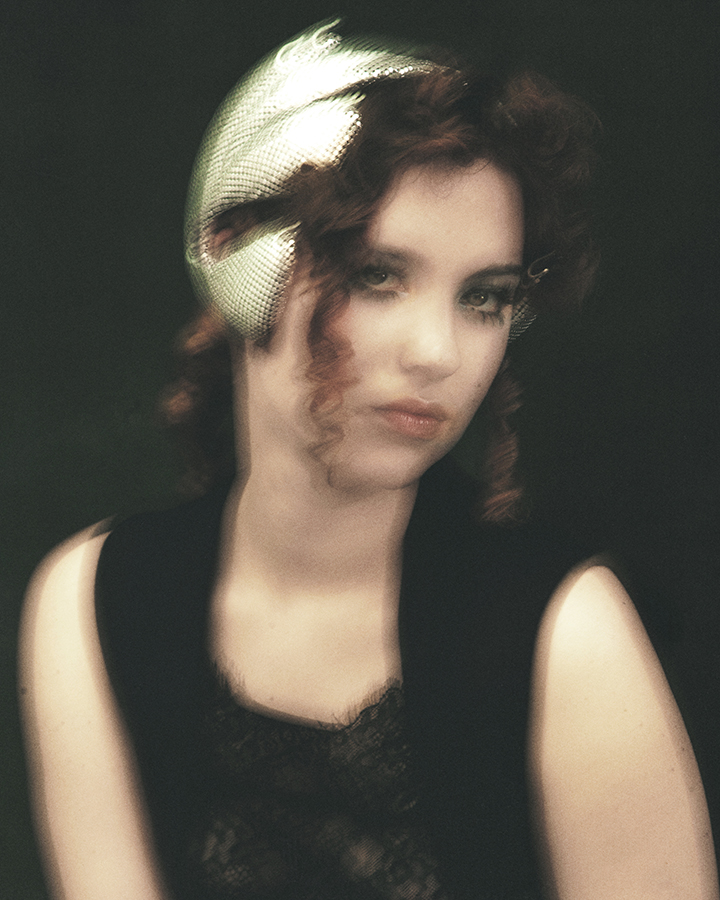
Photographer Andrew Kimber
Videographer Vitalij Sidorovic
Stylist & Art Director Eve Fitzpatrick
Make-up Artist Chiharu Wakabayashi using Fenty Beauty & Fenty Skin
Hair Stylist Kyosuke Tanzawa
Talent Avice Caro
Casting & Words Leelou Reboh
Studio Assistant Hannah Abraham
Fashion Assistant Amanda Flor

